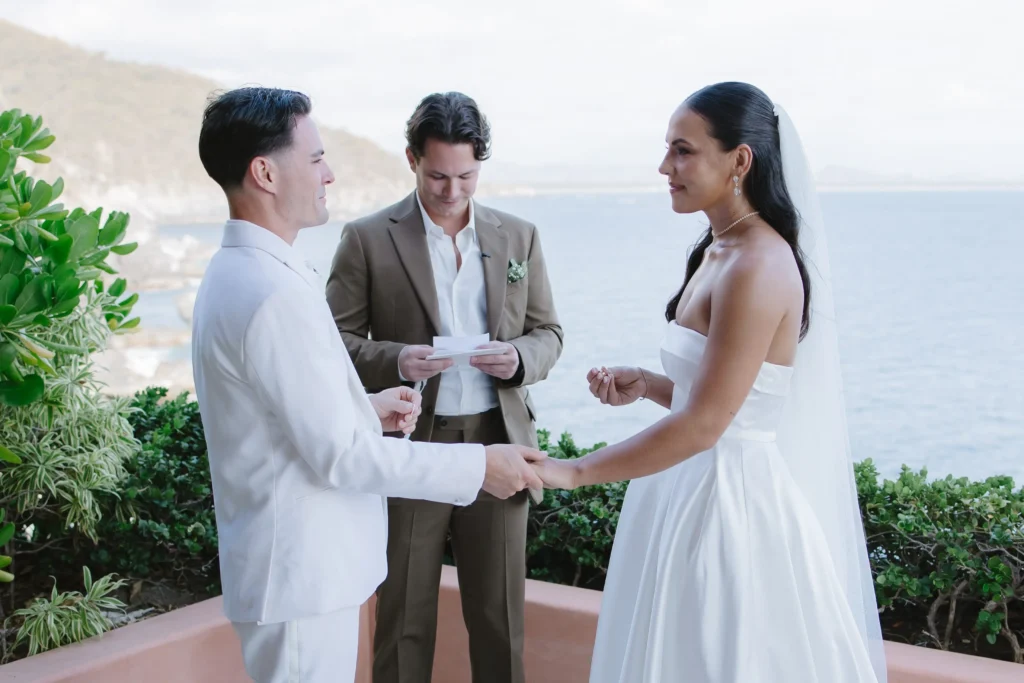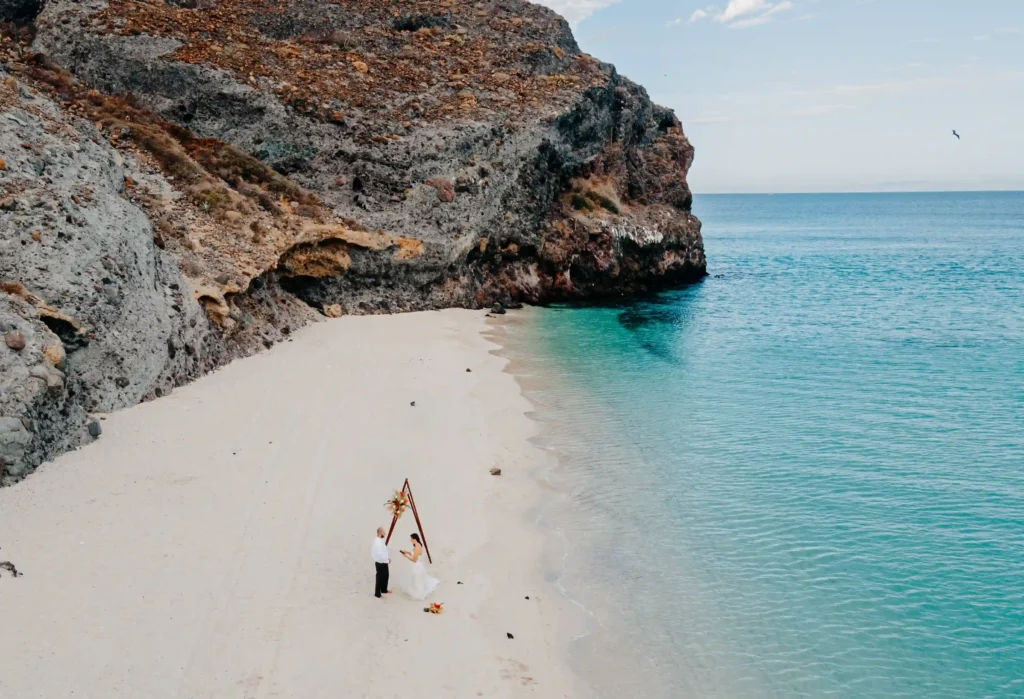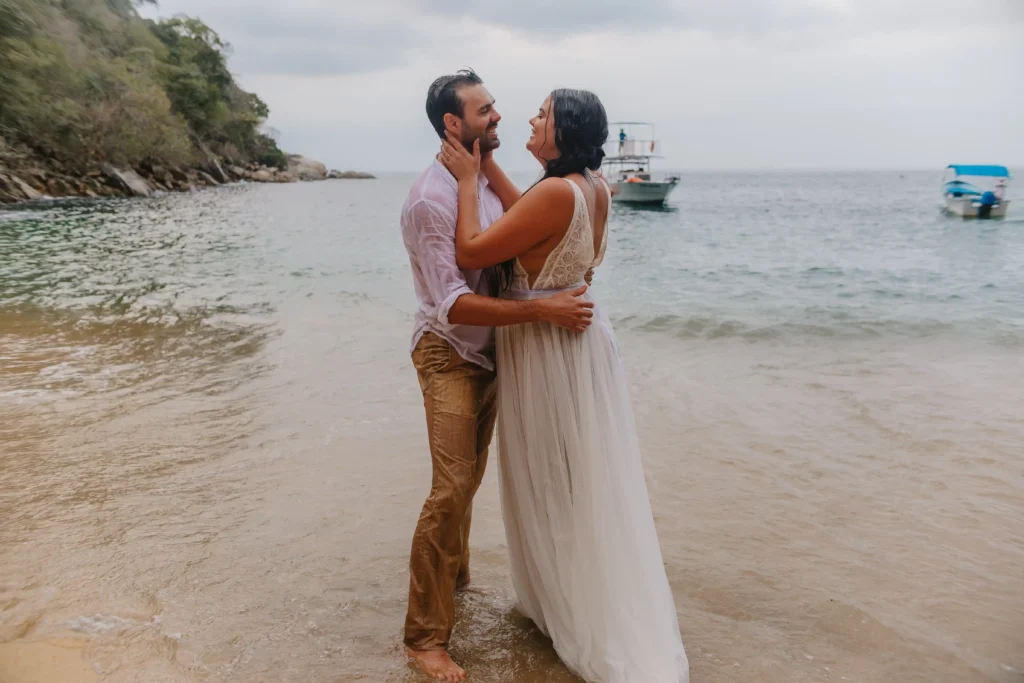Why Elope in Mexico?
Mexico is one of the easiest and most exciting places to elope, especially if you’re coming from the U.S. or Canada. There are plenty of direct flights to major cities and coastal towns, making travel smooth and accessible.
But what truly makes eloping in Mexico special is the experience. It’s not just about your wedding day, it’s about soaking in the food, the culture, the warmth of the people, and the feeling of being somewhere completely different. Everything adds meaning without requiring extra effort.
You can elope in one beautiful spot and head to another for your honeymoon, many couples I’ve worked with have done this. Plus, your budget goes further here. With the currency exchange, vendors and services are often more affordable than in your home country.
No matter if you’re in a quiet beach town or a lush mountain area, there’s always something to do: hiking, sailing, waterfalls, horseback riding, or just watching the sunset. Your elopement can easily become a full-day adventure you’ll never forget.
Legal vs. Symbolic Elopement in Mexico
Many couples from the U.S. and Canada choose to elope in Mexico but when it comes to the type of ceremony, you have two options: legal or symbolic.
✶ Legal Elopement in Mexico
Having a legal wedding in Mexico is possible, but it comes with extra paperwork and requirements that can vary by state.
To get legally married in Mexico, you may need:
- A valid passport and visa (or tourist card)
- Birth certificates (translated into Spanish)
- A pre-nuptial agreement (property status: joint or separate)
- Medical certificate from a Mexican doctor
- Divorce or death certificates if previously married
- Parental consent if under 18
- In some states (like Quintana Roo): 4 witnesses with ID, and a Certificate of No Impediment (CNI)
All foreign documents must be apostilled in your home country and translated by an official Mexican translator. It’s recommended to work with a local planner or coordinator to help with the process.
✶ Symbolic Elopement in Mexico (Most Popular)
Most couples choose a symbolic ceremony instead. It’s easier, faster, and more flexible no legal paperwork required in Mexico.
You can:
- Get legally married at home first (civil court)
- Then travel to Mexico for your elopement and exchange vows
- Have a friend or professional officiant lead the ceremony
- Include special rituals like a cacao ceremony or spiritual blessing
Many couples also celebrate again with family back home — like a dinner or small party.
A symbolic elopement gives you full freedom to focus on the moment, not the paperwork.

Best Places to Elope in Mexico
Mexico is a vast and diverse country offering more than just gorgeous beaches — it’s full of culture, color, and breathtaking natural beauty. From mountains to deserts, from quiet lagoons to jungle trails, every region offers something unique.
As a local photographer who has explored much of the country, here are some of my favorite locations for couples planning an intimate and unforgettable elopement in Mexico.
✶ Tecolote Beach – Baja California Sur
White sand, blue water, and a backdrop of mountains and cactus make this beach perfect for nature lovers. It’s especially magical at sunrise, with soft light and peaceful surroundings. For privacy, it’s best to avoid weekends.
Just 50 minutes from La Paz International Airport.

✶ Organo Beach – Oaxaca
This secluded beach is located inside a National Park and can be reached by a 20-minute jungle hike or boat ride. Its remote setting makes it ideal for couples who want an intimate elopement away from busy towns.
A permit or fee is required for park entry.

✶ Bacalar Lagoon – Quintana Roo
Known as the “Lake of Seven Colors,” Bacalar has fresh turquoise water and scenic spots for paddleboarding, kayaking, or sunset sailing.
You can get here by car from Cancún Airport or take the new Mayan Train.

✶ Mineral del Chico – Hidalgo
A charming mountain village within a National Park, surrounded by pine forests and scenic overlooks. It’s ideal for couples who want to elope somewhere cultural and off-the-beaten-path.
Only 2 hours from Felipe Ángeles International Airport (near Mexico City).

✶ Coral Island – Nayarit
A quiet island perfect for birdwatching, fishing, and hiking. Ideal for couples who want a wild and peaceful experience.
Reachable by boat from Rincón de Guayabitos. The nearest airport is Puerto Vallarta, making it easy to combine with time in the city. Sunrise ceremonies here are magical.

✶ Punta Lobos – Todos Santos, BCS
One of the most scenic spots in Baja, with dramatic cliffs, desert mountains, and coastal cactus views. You can hike 40 minutes or take an ATV for easier access.
Visit in October or November for a chance to witness sea turtle hatchlings being released.

Best Time of Year to Elope in Mexico
One of the great things about eloping is how flexible it can be, I’ve worked with couples who planned their ceremony just 2–3 weeks in advance, often because they were already visiting Mexico and thought, “Why not elope while we’re here?”
But if you want the best weather and fewer crowds, it’s worth doing a little research based on the specific region you’re considering. Mexico is a huge country with multiple climates, so the best time to elope depends on your destination.
Here’s a quick overview of the best months by region:
- Yucatán & Quintana Roo (Tulum, Bacalar, Cozumel): December to April (dry season, less rain).
- Oaxaca Coast (Huatulco, Zihuatanejo): October to April for sunny days and fewer storms.
- Puerto Vallarta & Nayarit Coast (Sayulita, Rincón de Guayabitos): December to May.
- Los Cabos & La Paz: October to May. December–February can be windy and busier.
- Valle de Guadalupe & Ensenada: Best in April–May or September–October (shoulder seasons, ideal weather).
???? Pro Tip: Golden hour (sunrise or sunset) is always the best time for photos, softer light, cooler temperatures, and fewer people around.
How Much Does It Cost to Elope in Mexico?
The cost of eloping in Mexico can vary depending on your travel style, the location, season, and the type of experience you’re planning. But overall, elopements in Mexico are significantly more affordable than traditional weddings.
Instead of renting a large venue or planning a party for 100+ guests, most couples choose to focus on an intimate, meaningful experience, like a romantic dinner under the stars, just the two of you.
✶ Typical Elopement Budget Range
Most couples spend between $5,000–$20,000 USD for a full elopement experience in Mexico. This includes travel, accommodations, ceremony, vendors, photography, and a few extras. The higher range typically reflects high-season travel or luxury-style details.
✶ Cost Breakdown Example (High Season)
✈️ Travel & Accommodation
- Flights (U.S./Canada): $400–$1,000 per person
- Hotels or Airbnbs (6 nights): $1,000–$1,500 total
Ceremony & Vendors
- Officiant: $200–$500
- Hair & Makeup: $200–$700
- Flowers (bouquet + small decor): $200–$700
Photography
- Coverage (3–10 hrs): $1,550–$4,800+
(My packages include drone coverage, a free consultation, vendor/location tips, content creator, a slideshow, and 5–10 Instax prints you can keep the same day.)
No extra travel fees.
Transportation
- Rental SUV (with full insurance): $400–$800
Tip: Book early during high season. Bring a credit card, passport, and driver’s license.
Optional Extras
- Add-on experiences like private boat tours, chef dinners, horseback rides, or hiking excursions can elevate your day and make it unforgettable.
✶ Sunset Elopement Timeline in Puerto Vallarta
Looking for inspiration for your Mexico elopement timeline? Here’s a real example based on a couple who stayed at Velas Vallarta and set sail from Marina Puerto Vallarta with Pato Bobo Adventure Boat

???? This sample timeline is ideal for early to mid-December, when sunset in Puerto Vallarta is around 6:00 PM. Adjust times slightly based on your date and season.
⏰ Sample Puerto Vallarta Elopement Timeline:
- 8:00–9:00 AM – Private breakfast in your room (just the two of you)
- 10:00 AM – Organize vows, rings, and other essentials
- 11:00 AM – Makeup artist arrives (timing may vary)
- 12:00 PM – Start getting ready; I arrive to begin capturing the day
- 1:00 PM – Consider ordering pizza for yourself and your guests (trust me, you’ll want a bite before the ceremony!)
- 2:00 PM – First look + portraits with family and friends
- 2:40 PM – Head to Marina Puerto Vallarta
- 3:00 PM – Board your private boat and enjoy a scenic ride to Colomitos Beach, stopping at Los Arcos de Mismaloya for photos
- 4:30 PM – Beach ceremony
- 5:00 PM – Couple portraits and beach celebration (yes, you can jump into the water!)
- 6:00 PM – Dinner, music, and sunset celebration on the boat ride back
Do You Need a Planner for Your Mexico Elopement?
Not every elopement in Mexico needs a wedding planner but sometimes it truly helps. If you’re planning a micro wedding with guests, a sit-down dinner, or something more logistically involved (like florals, permits, or multiple vendors), I always recommend working with a local planner. They take the pressure off so you can fully enjoy your celebration.
But if it’s just the two of you (or a small group), you’re in great hands. I help with everything from building your timeline and choosing the perfect ceremony location, to giving honest advice and recommending trusted local vendors. I’ll even help with Spanish-English communication if needed.
My goal is to make your Mexico elopement feel easy, meaningful, and stress-free even without a planner.
Ready to plan your destination wedding elopement?
Still not sure where to start? The first thing I usually ask couples is: Do you want to include guests, or keep it just the two of you? Once that’s clear, I’ll help you find the perfect location based on your personalities and how you imagine your special day.
We’ll figure things out along the way and make it all come to life, naturally and with intention.

